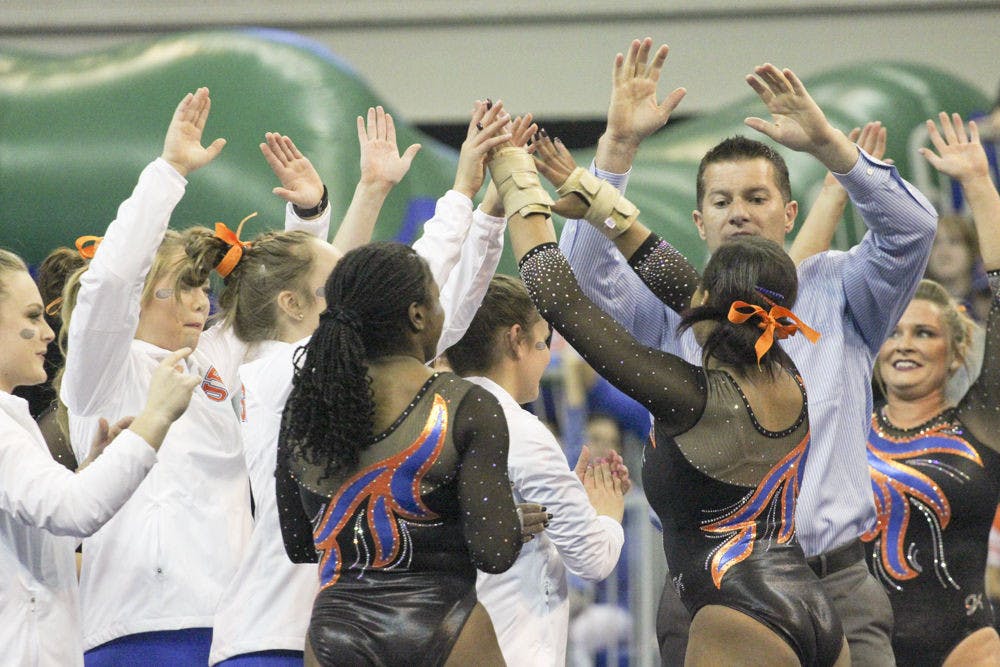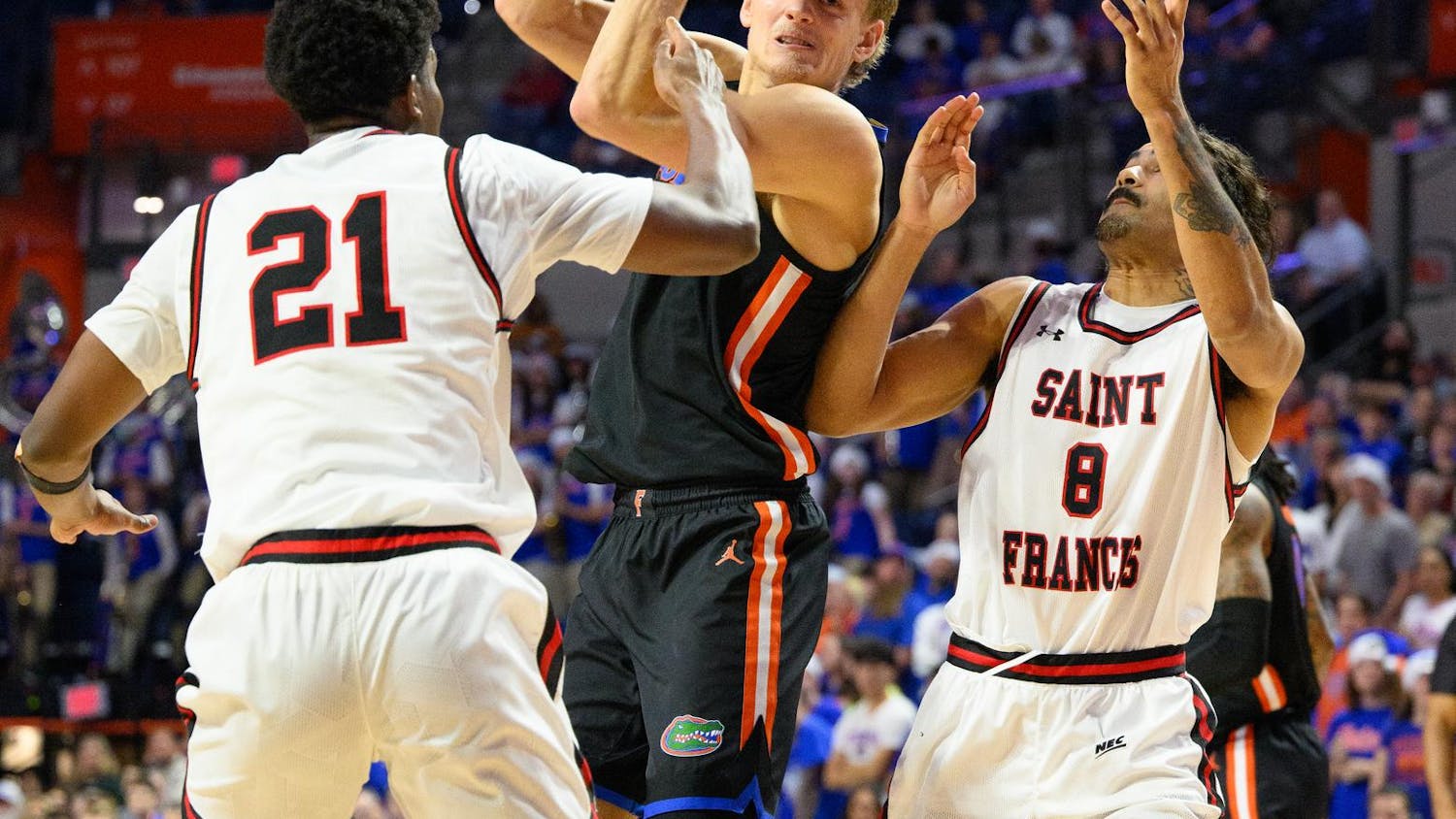At first, he’s hard to notice.
For a grown man in a button-down and slacks, assistant gymnastics coach Adrian Burde fades into a sea of gymnasts with ease. He patrols the vault runway, taking his usual spot next to the landing mat.
As Florida’s vault team prepares to perform, he relays last-second recommendations to his gymnasts via predetermined signs. He silently observes them as they make their approach.
But upon their landing — and without fail — he explodes.
Punctuating the air with an enthusiastic fist pump, Burde raises his hands in celebration, congratulating his gymnasts with high fives.
To most, it’s just another display.
For coach Burde, it’s more than a passionate outburst.
His presence calms his athletes. His energy inspires them.
And, much like it has for the past 10 years, and much like it will when Florida begins competition in the NCAA Championship Semifinals at 2 p.m. in Fort Worth, Texas, his philosophy pushes them to test their limits, both on and off the mat.
"I don’t know where it started, but it just feels good, man," he said. "When they look good, when they do good, we should show them that they do good.
"Makes sense?"
• • •
In Romania, gymnastics is king.
The small Eastern European state holds its own on the global stage, with the women medaling in the event at every Summer Olympics since 1976 and owning the first perfect 10 in Olympic history.
It’s a nation steeped in tradition. It’s also where Adrian Burde began his athletic career.
From the age of 6, training was a structured affair, with twice-daily practices sandwiching his formal schooling.
The regimen produced a talented gymnast, one who earned a spot on the Romanian Junior National Team from 1988 to 1992 and claimed the 1994 French National All-Around title while competing for club team Aix les Bains.
It also gave him a glimpse of his future.
"When you spend 6 to 8 hours in the gym as a gymnast, you pretty much develop your brain," Burde said. "You understand gymnastics so much better than somebody that doesn’t spend that much time in the gym or maybe never spends time in the gym."
That understanding was first used in 1994, when he began his first of six years as a coach for the Romanian Junior National Team.
It was legitimized when he enrolled at the Romanian National School of Coaching, graduating in 1996 with a degree in International High Level Gymnastics before joining the staff of Steaua Bucharest — the country’s premier junior club — a year later.
"If you wanna be a coach in Romania, you can’t just knock on somebody’s door and say, ‘Hey, I wanna be a coach,’" Burde said. "You have to go to school. You have to learn how to spot. You have to (learn) biomechanics. You learn physics."
Romania formed his coaching philosophy.
His next step would force him to adapt it.
• • •
Adrian Burde’s coaching career was on the rise.
With an impressive coaching résumé, he was ready to take a risk to further his prospects.
"It’s funny, because when I moved to United States, I didn’t know anything about United States," he said. "I got here at 10:30 at night, and the next day, I was in the gym coaching."
Burde locked down a job managing the girls’ Level 10 and International Elite programs at the Norman, Oklahoma-based Bart Conner Gymnastics Academy, a club co-owned by five-time Olympic gold medalist and fellow Romanian Nadia Comăneci.
However, a key difference soon emerged — one uncommon in his homeland.
Before his move to the United States, Burde never worked with more than a handful of athletes at a time. He was a specialized trainer focusing on a single discipline.
But stateside, Burde found himself in charge of 44 competitors across four events.
And with only one other coach to aid him, it was difficult to provide quality instruction.
But even in his new environment, Burde’s knack for managing gymnasts was evident.
It was a quality apparent to current Florida head coach Jenny Rowland, who worked alongside him at Bart Conner for 16 years.
"I would say Adrian’s passion for gymnastics is unlike a lot of people’s, and he is one that he cannot just hold it inside," Rowland said. "It just automatically comes out. He wears his passion on his sleeve, he wears his heart on his sleeve, and it’s great for the girls to see that."
While that first impression would last, his stint in Oklahoma would prove short-lived.
Within a year-and-a-half, he’d be coaching like he did in Romania.
He’d also learn something that his degree couldn’t give him.
• • •
For the last 23 years, University of Nebraska head coach Dan Kendig has faced the same problem.
Traditionally, the Midwest hasn’t attracted top-tier gymnastics recruits.
But he inexplicably produces results, leading the program to 11 NCAA Super Six Finals and claiming 139 All-Americans in the process.
It was here Adrian Burde grew the most.
The collegiate coaching structure mirrored that of his native Romania. The hands-on attention appealed to Burde, and he made it known.
"It happened very fast, very quick," he said. "I really, really liked the idea of coaching in a system that is very similar to what I grew up in."
It was unlike anything Burde had ever seen.
Athletes seem to bloom both on and off the mat under the Kentucky graduate.
Kendig said he looks for three qualities when recruiting gymnasts.
They need to be good athletes.
They need to be good students.
And they need to be good people.
"If one of those three are missing," Kendig said, "then you’re spending a lot of time on things that you don’t need to be spending time on."
Over five seasons, Burde watched as Kendig took recruits and transformed them into talented competitors. He observed how Kendig relied on positivity to boost his managerial skill. He took in every lesson, growing like the gymnasts Kendig coached.
"What he does with that team, it’s not coaching gymnastics. It’s coaching people, making good people," Burde said. "He’s very positive. He’s one of the best motivators that I’ve met."
And now, even after 10 years away from Lincoln, Nebraska, Kendig’s principles shine through in Burde’s own philosophy.
"I learned so much from Dan. …(It’s like) yeah, you’re a good athlete, you’re super talented, but I still think that if you’re a good person too, you’re gonna go so much further than just the talent that you have," Burde said.
"That’s what Dan is coaching. Dan does more."
• • •
When the Florida Gators hired Adrian Burde to coach uneven bars in 2007, they desperately sought more.
The school had the resources.
There just seemed to be a disconnect.
Before Burde’s hiring, UF’s bars rotation had finished in the top five nationally just once since 1998. The program hadn’t won a Southeastern Conference title since 1989 — let alone its first NCAA National Championship.
Florida was looking for an impact.
Burde’s was instant.
With a top-ranked bars unit, the Gators went a near-perfect 21-0-1 in his inaugural year, culminating in an SEC championship and a third-place finish at the Super Six.
Each passing year proves his early success wasn’t a fluke. It’s hard to argue against someone who’s earned five Southeast Region Assistant Coach of the Year awards.
His results are tangible. His managerial pedigree is obvious.
What isn’t, though, are the methods he employs to gain them.
Every week, Burde takes time out from practice to motivate his team — not on the mat, but on the Internet.
"We do a small video, something that (tries) to push them just a little more on their performance, on the quality of life and … the way that life should be lived," he said.
These "Burde Beats" are a unique twist on Kendig’s philosophy — that there is more to life than gymnastics.
The girls have responded to his message, with gymnasts regularly pressing Burde for another session.
His energy and positivity are infectious.
And with each passing victory, his methods gain further validation.
"Training, it’s good, but if you don’t train as a good person … you’re gonna hit a limit (where) you’re not gonna be able to achieve what your goal was," he said.
"You have to work from both directions."
• • •
Ask anybody about Adrian Burde, and one thing quickly becomes apparent.
His dedication to his craft is second to none.
"Energy and attitude is very contagious," sophomore Alex McMurtry said, "but it’s the same thing with Adrian. We see how excited he gets about vault and floor, and that just translates to us."
That much has remained consistent — from job to job, his passion rubs off on athletes and coworkers.
His dedication to people, though, burns brighter.
It was obvious in his early coaching years, when he freely volunteered to help younger gymnasts at Aix les Bains.
It was obvious when he made the transition from club to college, buying into Kendig’s philosophy and endearing himself to coaches and athletes alike.
"The whole team just fell in love with him," Kendig said.
"I think the world of him. I think the world of him as a person, as a coach, as a friend."
And it remains obvious now.
"(The girls) like to make fun of him, but at the same time, it’s great," Rowland said. "He is such a huge asset to the team, because without his energy, without his passion, this team would not be where it is today."
That, arguably, is what sets him apart.
These traits — his willingness to give, to share his emotions with others — are as characteristic of his personality as they are his coaching.
It’s something that shines through on a daily basis.
And, before a practice session on March 28, five days before his gymnasts clinched Regional gold in Minneapolis, it was a point of emphasis.
"Today the subject, talking about the Burde Beats, it’s actually (about) the power of giving. That’s what I’m gonna talk about today," Burde said.
"The power of giving. It’s an interesting subject."
Contact Alejandro Lopez at alopez@alligator.org and you can follow him on Twitter @ajlb95.
Adrian Burde celebrates with Florida gymnasts during UF's loss to LSU on Feb. 26, 2016, in the O'Connell Center.






